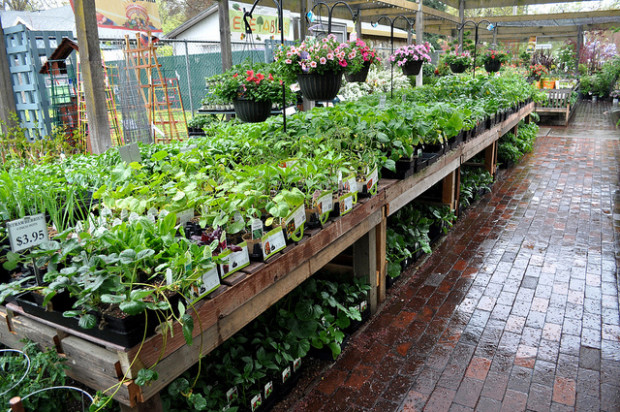Whether you’re planting a vegetable garden or designing a back yard garden landscaping project, if you’re not starting with seeds, it’s important to buy healthy nursery plants from the start.

Shopping for plants for a garden landscaping job or to add some color to your windowsill is usually a pleasurable activity. Most people instinctively choose healthy, robust garden landscaping plants; however, there are subtle signs of poor health to look for when you’re out shopping.
Here’s a checklist of items to take along when choosing nursery plants for a garden landscaping project or vegetables from the hot house or other grower.
Check overall condition and examine plants by species before choosing individuals
Evaluate the nursery first to reassure yourself that plants are well cared for in general. Examine the overall state of the garden plants to make sure they look fresh and healthy. If you’re shopping for organic vegetables, buy from a reputable grower and check to be sure you’re buying truly organic stock. Examine the leaves and stems on a variety of plants to get an overview of the nursery’s quality.
Check the shape of a group of nursery plants in a particular species for conformity and health. Choose one or more that is healthy looking and uniform in size and shape within that group. Larger or taller plants are not always better, sometimes being weakened from being overgrown.
Check plants for diseases, insect damage, and root integrity
Look for the presence of insect damage on several plants and in surrounding soil. Dark spots, mildew, distortions, juicy areas, holes, white powdery areas and sliminess may indicate disease or insect infestation. Avoid these plants and any in their grouping.
Examine nursery plant roots to make sure they’re healthy and not so overgrown they need immediate re-potting. Ensure that the root ball is not broken or showing evidence of rot. The root ball should be firm with a slight bounce when gently squeezed. If the root ball is broken, it may indicate that the roots are damaged and be a tell tale sign that the plant will have future growing problems.
Check flowering nursery plants for large numbers of unopened buds. Flowers tend to bloom better after the plant is re-potted or has been planted in the ground.
Evergreen plants and shrubs should be healthy and well formed
If you’re buying evergreen plants for your landscape garden, examine the needles for overall health. Large sections of brown needles indicate poor health, the presence of insects, or overall lack of care... READ MORE HERE: http://www.jbbardot.com/easy-guide-to-help-you-choose-the-best-nursery-plants-for-landscaping-and-vegetable-gardens/
Go here, The JB Bardot Archives, for more great articles on natural health and alternative life styles.
No comments:
Post a Comment